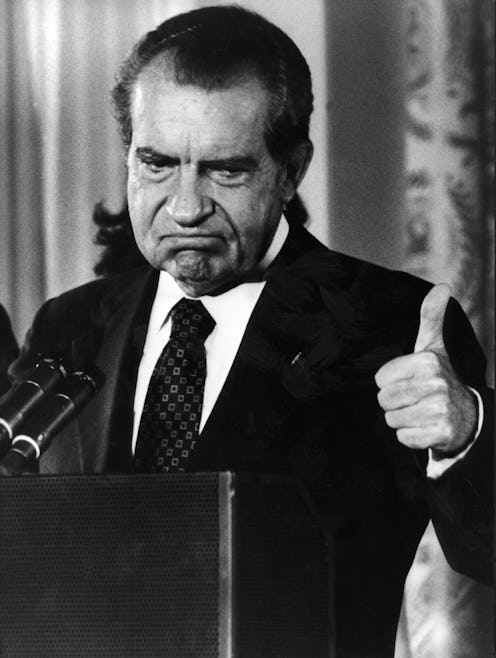News
The Footage That Brought Watergate Crumbling Down
The hearings for Watergate, potentially the largest scandal in U.S. history, began 43 years ago, on May 17th, 1973. The hearings themselves are a compelling window into a time in the American narrative that was marred by federal corruption, distilling a particular distrust within our country's citizens for decades. Yet there is one fascinating piece of footage from the original Watergate hearings that sticks out above the rest: The moment in which the tide turned and President Richard Nixon's facade began to truly crumble.
It was in this moment that a Senate committee, as well as a captive nation who watched the hearings unfold on television, learned straight from the mouth of one of Nixon's aides that the president had installed recording devices throughout the White House. This information came from Alexander Butterfield, who broke open the case when he revealed that these devices had been placed in the Oval Office, and that all conversations Nixon was a part of had been recorded.
This ultimately led to Nixon's resignation as president — the recordings implicated him directly in the Watergate scandal, providing the Senate with the "smoking gun" tape. This tape was recorded just days after the initial break-in to the Democratic National Committee, during which Nixon's men wiretapped several of the DNC's phones. The "smoking gun" tape revealed that Nixon had been attempting to divert the investigation by lying to the FBI.
Butterfield discloses this all-important information in this piece of footage:
The deputy assistant had not intended to share that information, however; he vowed not to offer up details of the Watergate scandal unless directly asked. So when Senate Watergate Committee investigators came to interview him, he had had all intentions to remain quiet about the tapes. But when an investigator inquired point-blank about a particular document that contained verbatim quotes between Nixon and White House Counsel John Dean — asking him if this meant a taping system existed — Butterfield had no choice but to tell the truth. “I’m sorry you asked me that question,” Butterfield told the investigator. Just two days later, he testified in front on the committee and the American public.
Butterfield suffered professionally after revealing the truth. He lost his job at the Federal Aviation Administration and struggled to find work for some time after. Though Butterfield was never implicated in the Watergate scandal, his association with Nixon ultimately cost him for years down the line.
Most recently, Butterfield has been the subject of a new book, The Last of the President's Men, by author and famed journalist Bob Woodward. The book delves into Butterfield's life as Nixon's assistant, intimately chronicling his time with the president. Perhaps most telling though is what happened after the book was published in October 2015: Butterfield got a call from the FBI, and they came to his home to collect classified documents that the aide had taken with him when he left the White House. Even after all of these years, Nixon — and Butterfield's association — is the subject of a federal fascination.
